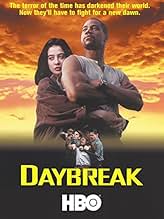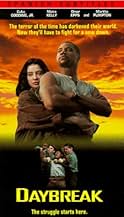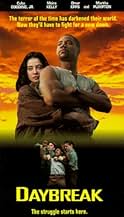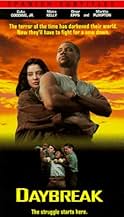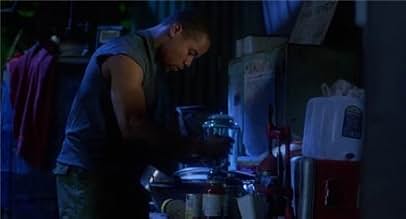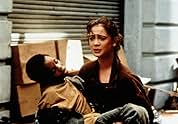VALUTAZIONE IMDb
5,0/10
1962
LA TUA VALUTAZIONE
Aggiungi una trama nella tua linguaThis drama, based on Alan Bowne's play "Beirut," takes place in a decrepit New York City of the near future, controlled by a fascist government.This drama, based on Alan Bowne's play "Beirut," takes place in a decrepit New York City of the near future, controlled by a fascist government.This drama, based on Alan Bowne's play "Beirut," takes place in a decrepit New York City of the near future, controlled by a fascist government.
- Regia
- Sceneggiatura
- Star
Mark Boone Junior
- Quarantine Guard
- (as Mark Boone Jr.)
Charles Mattocks
- Tommy
- (as Charles 'Soll Food' Mattocks)
Recensioni in evidenza
I, too, thought that this was an excellent film; the first time i saw it I was on the verge of turning the TV off for lack of anything good. Although it's genre is listed as sci-fi it's not immediately apparent that it's sci-fi, which allows you to concentrate a little more on the people and production design. The grittiness is very well done, much like Max Headroom, and the characters are very thoroughly developed throughout the first two thirds of the film. The ending is particularly good - the viewer feels genuine empathy for both Moira and Cuba's characters and is left with the feeling that these are real people in an imperfect future.
This 1993 movie is one of a long line of dystopian (also called "awful warning") stories. In this case one of the key ideas that make dystopias interesting--a fascist government using paranoia to keep the masses in line--is swamped by the romance between Cuba Gooding and Moira Kelly. Of course there is a place for love in such a story--remember Winston Smith and Julia in Nineteen Eight-Four--but in Daybreak the love story eventually overwhelms everything else, and ideas go out the window.
The treatment of the disease that is supposedly rampant in this near-future world is ambiguous. No, the disease doesn't seem like AIDS, but it's unclear just what it is, how much of the population is afflicted by it, and whether or not it is really deadly. At times, you get the sense that the government invented the disease to spread fear among the people, but, then again, clearly some of the people in the movie are sick. It's all sort of confusing.
Cuba Gooding's character is one-dimensional. At first he's very angry and refuses to have anything to do with Moira Kelly. Then, aw shucks, he is forced to admit he really loves her. Moira Kelly's character is semi-believable. To me, however, the really interesting character is that played by Martha Plimpton, who makes the character come alive and has a very interesting face in the bargain.
Somewhere in this movie is a good idea that never manages to break free.
The treatment of the disease that is supposedly rampant in this near-future world is ambiguous. No, the disease doesn't seem like AIDS, but it's unclear just what it is, how much of the population is afflicted by it, and whether or not it is really deadly. At times, you get the sense that the government invented the disease to spread fear among the people, but, then again, clearly some of the people in the movie are sick. It's all sort of confusing.
Cuba Gooding's character is one-dimensional. At first he's very angry and refuses to have anything to do with Moira Kelly. Then, aw shucks, he is forced to admit he really loves her. Moira Kelly's character is semi-believable. To me, however, the really interesting character is that played by Martha Plimpton, who makes the character come alive and has a very interesting face in the bargain.
Somewhere in this movie is a good idea that never manages to break free.
I it is strange as I read through all of the other write ups is the big split between the people who think it was good and the others who think it was not much middle ground, I often think that is the mark of a good film.
Having seen this twice now the first time with nothing to watch flicking around I catch it just as the two girls are running out of the 'testing centre' within 10 minutes I had seen the start of a good story that followed on to the end. Yes it did get a bit thin towards the end but it was a TV movie so I did not expect a $50 million block buster it works for what it was. Even so it still had that ability to show the real problems of parts of society and that if some things are not property addressed that they could easily turn out that way.
Having seen this twice now the first time with nothing to watch flicking around I catch it just as the two girls are running out of the 'testing centre' within 10 minutes I had seen the start of a good story that followed on to the end. Yes it did get a bit thin towards the end but it was a TV movie so I did not expect a $50 million block buster it works for what it was. Even so it still had that ability to show the real problems of parts of society and that if some things are not property addressed that they could easily turn out that way.
I recorded this because the Tivo program guide description described the movie as a "two rebels fighting a fascist government in the near future." The movie starts promisingly with a failed escape from a medical institution that leads to an execution and an eerily prescient city street scene borrowed (or stolen) from Soylent Green -- a group of people standing around watching a TV behind a barred storefront window, a menacing group of paramilitary thugs intimidating a homeless person, and a couple of girls in uniforms with the label "WorkFare" getting off work.
This should have helped establish a backstory of a bleak near future of economic collapse, government propaganda and tyrany, and, as we're told later on, rampant disease and forced quarantine.
Instead of building on all these ideas to tell what could have been at least as good as "Handmaid's Tale", the script gets lost in a ridiculous love story between Cuba Gooding Jr. and Moira Kelly which is not redeemed even by two sex scenes featuring extensive topless footage of Moira.
The love story detracts from the all-too-plausible social premise of the movie that seems quite believable now: the government is using propaganda, a paramilitary "Home Guard" of thugs and forced internment of people infected with a disease in quarantine centers that are portrayed as country club resorts, but instead are more like Soviet-era prison hospitals where the patients are sent to die.
The budget must not have allowed for much location shooting or set dressing, as the premise of an America in deep decline is offset by Kelly and Martha Plimpton getting on a bus and a number of other scenes shot in high-rise Manhattan that would make it appear that life was functioning normally, in direct conflict to the other, Soylent Green like street scenes and overcrowded apartments.
The AIDS-like disease is also treated in a conflicting manner -- it apparently was a real disease, as Cuba Gooding's band of rebels was actually trying to aide those sick with it, and Gooding made a deliberate attempt to wear a condom before having sex with Kelly -- but we're also led to believe that the sypmtpoms, communicability and perhaps even treatability of the disease wasn't what the government said it was. It would have been more effective (and productive for the storyline) if the disease had been instead a creation of the government as an excuse to put people in a prison-like quarantine where they would die by other means.
Overall, a "near-future" concept which is actually chillingly plausable in our modern times (substitute genetically engineered smallpox for the disease and terrorism detention for the quarantine...) is ruined by a bad love story and a low-budget production.
If you do suffer through this movie, don't miss future Sex and the City characters David Eigenberg ("Steve") as Kelly's brother, and Willie Garson ("Stanford Blatch") as a member of Gooding's rebel gang.
This should have helped establish a backstory of a bleak near future of economic collapse, government propaganda and tyrany, and, as we're told later on, rampant disease and forced quarantine.
Instead of building on all these ideas to tell what could have been at least as good as "Handmaid's Tale", the script gets lost in a ridiculous love story between Cuba Gooding Jr. and Moira Kelly which is not redeemed even by two sex scenes featuring extensive topless footage of Moira.
The love story detracts from the all-too-plausible social premise of the movie that seems quite believable now: the government is using propaganda, a paramilitary "Home Guard" of thugs and forced internment of people infected with a disease in quarantine centers that are portrayed as country club resorts, but instead are more like Soviet-era prison hospitals where the patients are sent to die.
The budget must not have allowed for much location shooting or set dressing, as the premise of an America in deep decline is offset by Kelly and Martha Plimpton getting on a bus and a number of other scenes shot in high-rise Manhattan that would make it appear that life was functioning normally, in direct conflict to the other, Soylent Green like street scenes and overcrowded apartments.
The AIDS-like disease is also treated in a conflicting manner -- it apparently was a real disease, as Cuba Gooding's band of rebels was actually trying to aide those sick with it, and Gooding made a deliberate attempt to wear a condom before having sex with Kelly -- but we're also led to believe that the sypmtpoms, communicability and perhaps even treatability of the disease wasn't what the government said it was. It would have been more effective (and productive for the storyline) if the disease had been instead a creation of the government as an excuse to put people in a prison-like quarantine where they would die by other means.
Overall, a "near-future" concept which is actually chillingly plausable in our modern times (substitute genetically engineered smallpox for the disease and terrorism detention for the quarantine...) is ruined by a bad love story and a low-budget production.
If you do suffer through this movie, don't miss future Sex and the City characters David Eigenberg ("Steve") as Kelly's brother, and Willie Garson ("Stanford Blatch") as a member of Gooding's rebel gang.
Being a big fan of Sci-fi films I expected a much better film. The storyline sounded like heroes would be saving the world in a futuristic "not-so-good" city. However, starting well with good time spend on the lead women, and making it interesting enough for you to sit and watch, it died out as it went along. It's very strange, it's like the first hour of the film is preparing you for some action, like they are building the story line up for some big scene at the end. But the film dies out and leaves you completely hanging, not knowing anything more as to what happens to the main characters, or even what they were fighting for most of the time. I recommend that people stay well away from this one, as Cuba Gooding Jr. has sooooo much more to offer.
Lo sapevi?
- QuizFilmed in Washington heights new york on 158th street
- BlooperWhen Torch is painting Blue's face with dirt, the angle of the stripes change dramatically between shots.
- Colonne sonoreMany Rivers to Cross
Written and Performed by Jimmy Cliff
Published by Island Music, Ltd. (BMI)
Courtesy of Mango/Island Records Ltd.
I più visti
Accedi per valutare e creare un elenco di titoli salvati per ottenere consigli personalizzati
Dettagli
Contribuisci a questa pagina
Suggerisci una modifica o aggiungi i contenuti mancanti

